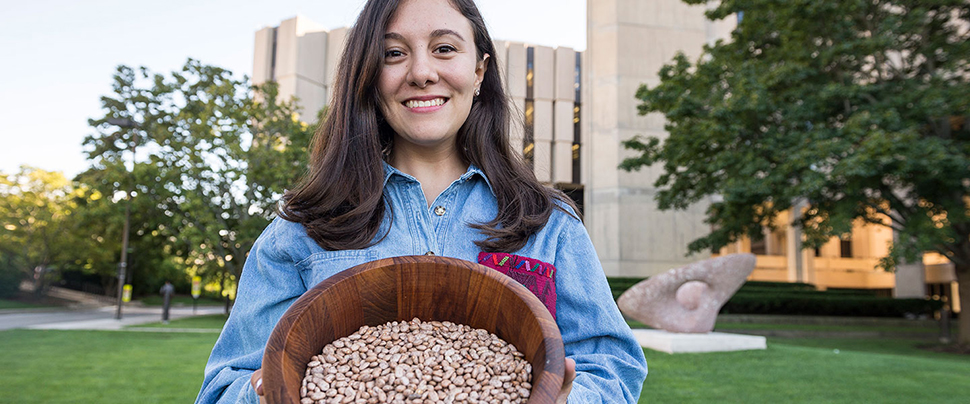One in a series of profiles on undergraduate research at Northwestern.
Odette Zero was volunteering in a small Guatemalan town flanked by volcanoes four summers ago when she started to take notice of a common narrative.
“Diabetes -- it’s endemic,” said the Northwestern University junior. “Every family has someone suffering from diabetes, and many people don’t understand the basics of the disease.”
Every family has someone suffering from diabetes, and many people don’t understand the basics of the disease.”
Weinberg, 2017
Located in south-central Guatemala and unknown to most, San Miguel Dueñas is like a second home to Zero, who has returned year after year with her mother, a native of the country.
An anthropology major in the Weinberg College of Arts and Sciences with a minor in global health, Zero saw an opportunity to help the people of San Miguel Dueñas separate fact from fiction on the causes, prevention and treatment of the disease.
With funding from the Roberta Buffett Institute for Global Studies, she spent part of this past summer exploring cultural perceptions of type 2 diabetes through personal stories, or “illness narratives.”
The stories pointed to local, inexpensive foods that the residents of San Miguel Dueñas already are eating but don’t necessarily know will help with diabetes, Zero said.
To get the word out about the readily accessible health benefits of these foods, Zero is now adapting a number of recipes from English cookbooks for diabetics using foods of the same nutritional value commonly found in markets in San Miguel Dueñas.
“My favorite is the chile con frijoles colorados, which is chili with red or black beans, onion and garlic mixed with corn, tomato and other veggies,” Zero said.
After completing only two years of college, Zero was able conduct her own independent research project abroad by drawing on her life experience as well as her work as a research assistant in Northwestern’s Laboratory for Human Biology Research last year.
“Being in the lab with my faculty and graduate mentors allowed me to practice a lot of the tools that I’m using right now on my own,” she said. “Otherwise, I would not be doing the work I’m doing.”
Read more in a Q&A with Zero, who recently spoke to Northwestern News about her research and reflected on her time at Northwestern.
Not many undergrads get the chance to work and conduct research in the same community year after year. What has that been like for you?
It’s definitely an advantage for me. In global health, researchers often go into another country and don’t always know the culture, customs or the language. I’m half Guatemalan, so coming in I already had a certain level of understanding.
What’s the goal of your research?
I’m collecting illness narratives -- qualitative interviews with people in the community who are diabetic -- to find out how they think about diabetes, its causes and how to manage the disease with a healthy diet. I want to compile the knowledge that’s already out there and make it accessible to a wider community so that people can take care of their bodies and live healthier lives.
What’s different about your methods for gathering information in a way that reflects the culture of San Miguel Dueñas?
Instead of reading studies or going online to find what plants, seeds and herbs help people with diabetes, I asked them what they are already using in their everyday lives. I was looking for things they can find in the markets that aren’t too expensive. There are foods people in the community already have access to but don’t know are useful in that way.
Did your previous work at the Laboratory for Human Biology Research feed into this project in any way?
In the lab, I was transcribing illness narratives from a Peruvian community in the Amazon and working closely with the grad student, Paula Talman, who collected them. She would have me analyze the conversations and connect the dots on things I’d been hearing in the interviews. Thinking about health in that way really changed my perspective.
Has undergraduate research changed the way you think about your studies?
Through my classes, clubs I’ve joined and relationships with my mentors in the global health and anthropology programs, my worldview has broadened. Doing research in the lab and here in the field has made me realize I want research to be part of my career. I want to really understand the whole person, and to do that requires more than determining the symptom and diagnosing the problem.


